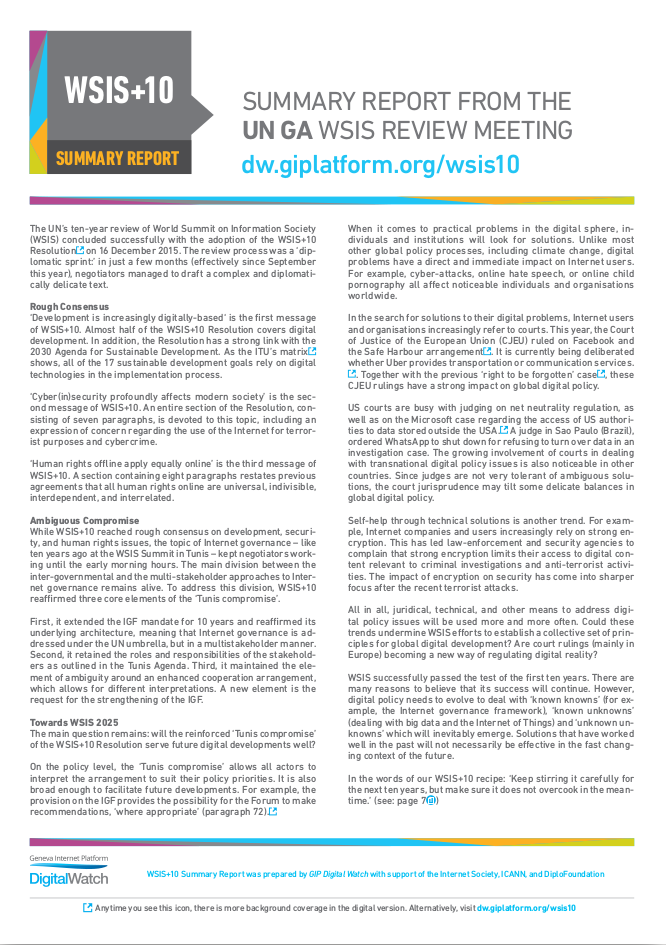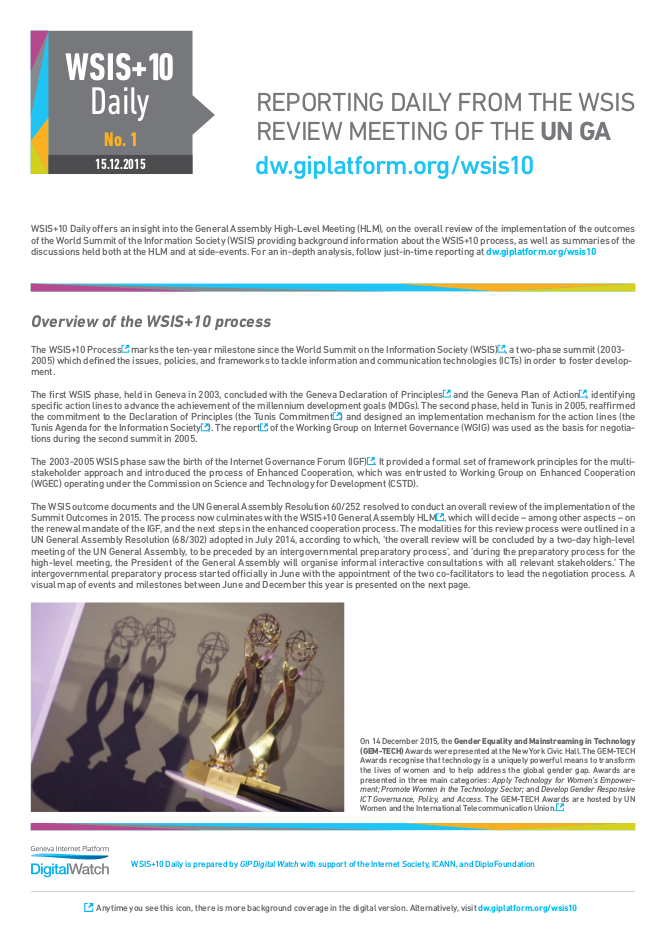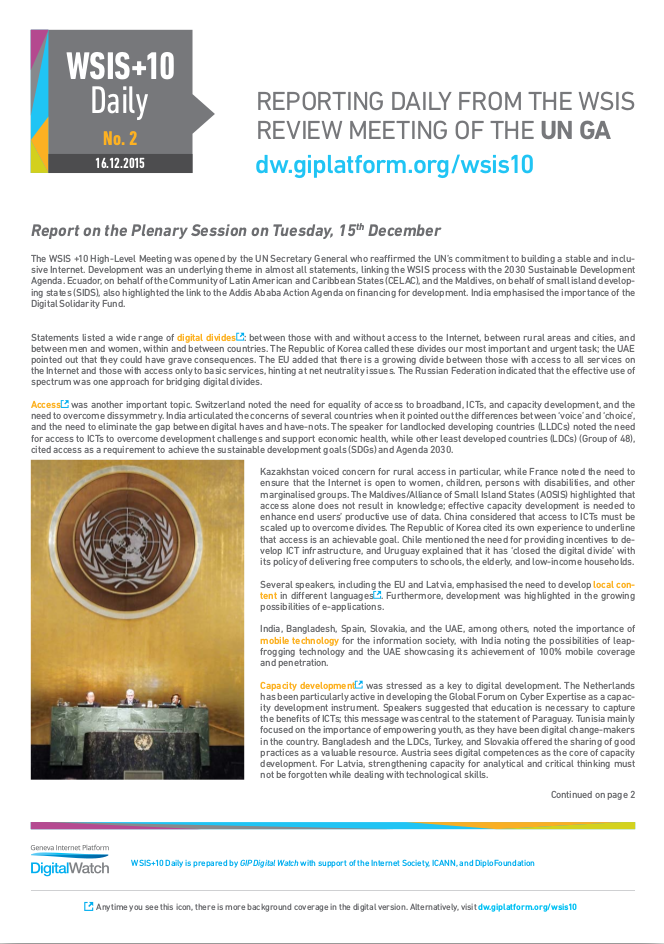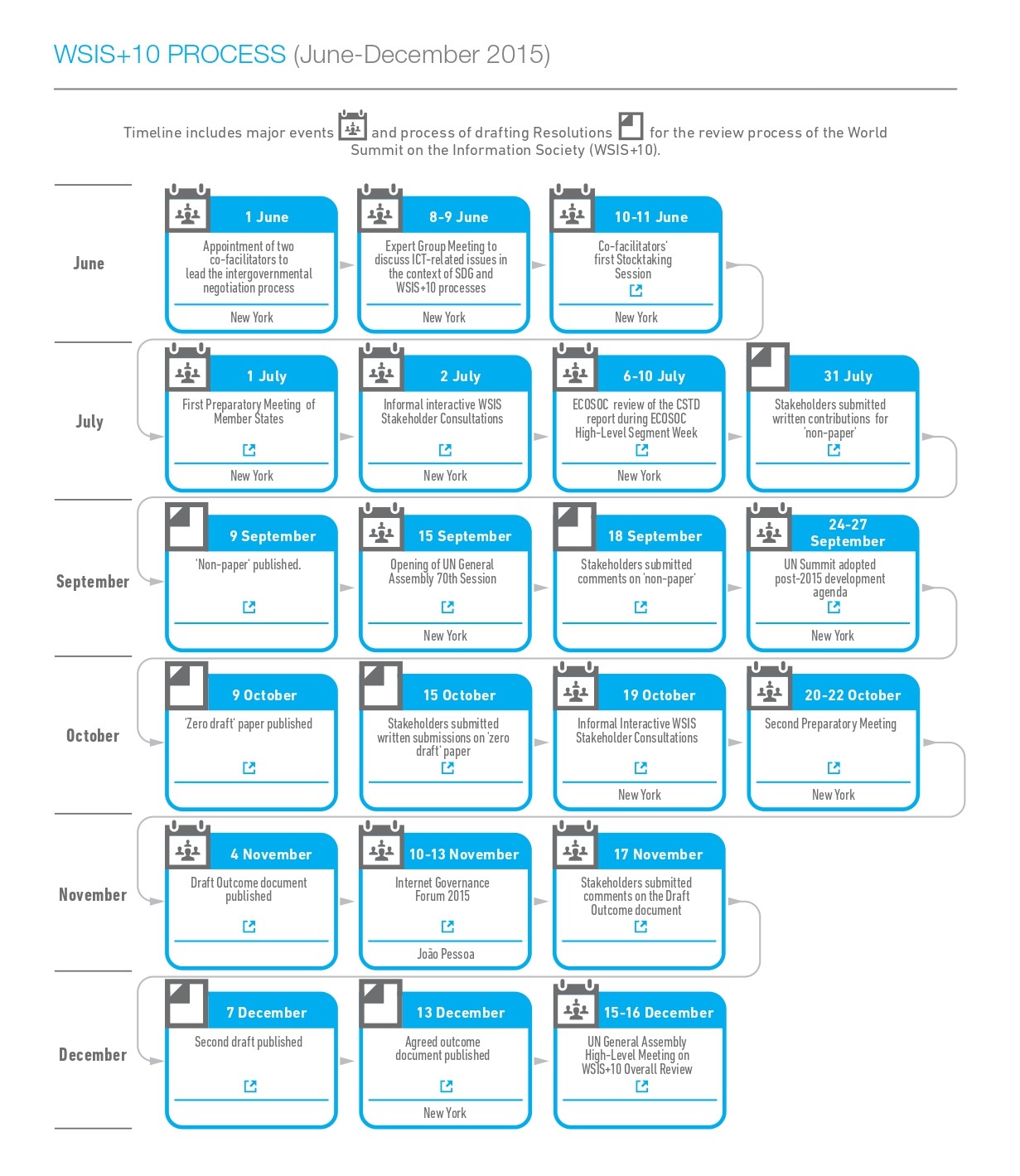The WSIS+10 Process
Tracking the ten-year review since the World Summit of the Information Society (WSIS+10), which culminated with a High-Level Meeting in New York, December 2015.
(Last updated: 22 March 2019)
Resources
The GIP Digital Watch observatory provided just-in-time reporting from WSIS+10 General Assembly High-Level Meeting (HLM), held on 15–16 December 2015. View or download our resources.
The WSIS+10 Summary Report, summarising the plenary debates of the High-Level Meeting
WSIS+10 Daily No. 1, providing background information about the WSIS+10 process and summaries of the discussions held at side-events on Monday, 14th December 2015.
WSIS+10 Daily No. 2, providing a report on the Plenary Session on Tuesday, 15th December 2015.
WSIS+10 Process timeline
The WSIS+10 Process marked the ten-year milestone since the World Summit on the Information Society (WSIS), a two-phase summit (2003-2005) which defined the issues, policies and frameworks to tackle information and communication technologies (ICTs) to foster development. In 2015, the process culminated with a high-level meeting of the UN General Assembly on 15–16 December in New York. Between June and December 2015, a number of events and milestones took place as part of the preparatory process leading up to the high-level meeting.
Timeline of main updates
- 16 December 2015: adoption of the outcome document of the high-level meeting of the General Assembly on the overall review of the implementation of the outcomes of the World Summit on the Information Society
- 13 December 2015: Agreed outcome document was made available.
- 8 December 2015: Geneva Internet Platform hosted the transmission from New York of a briefing by the co-facilitators on the progress of the intergovernmental negotiations of the WSIS Outcome document.
- 7 December 2015: The updated Draft Outcome Document was made available. Comments submitted on this second draft were also published.
- 10 November 2015: At the 10th Internet Governance Forum, WSIS+10 issues dominated the opening session. The key themes which emerged were: How Internet governance should evolve; how to address concerns related to increased use of the Internet; the role the Internet can play in achieving the Sustainable Development Goals (SDGs); and the role of governments in addressing Internet-related issues. Read more about the opening session (IGF Daily Issue no. 2, page 1), and see all the updates from IGF 2015.
- 4 November 2015: The draft outcome document was published. This will form the basis for textual negotiations during the informal consultations on 19-20 and 24-25 November. Member states and all relevant stakeholders were invited to submit comments on the draft outcome document via email to ungawsisreview at un.org until 17 November 2015. View the comments.
- 30 October 2015: Intense debates on the Zero Draft took place during the second preparatory meeting (20–22 October). The debates centred on the IGF extension, enhanced cooperation, support for multistakeholder model vs multilateral model, cybersecurity, a framework for Internet governance, funding mechanisms, and more. A second draft of the outcome document is expected to be published in November. The Zero Draft, published on 9 October 2015, introduced some new elements (such as a reference to net neutrality), while strenghtening some existing formulations (such as emphasis on development, and a more prominent role for governments). Consult the analysis of the Zero Draft by Dr Jovan Kurbalija. The Zero Draft was open for comments until 15 October 2015.
- 27 September 2015: Governments have unanimously adopted the 17 Sustainable Development Goals during the UN Summit on 25–27 September. Among other goals, governments have committed to ‘significantly increase access to ICT and strive to provide universal and affordable access to the Internet in least developed countries by 2020’ (Goal 9.c). The Internet will also be essential for the implementation and monitoring of the SDGs. Read more on the GIP's webpage dedicated to the Internet and SDGs.
- 25 September 2015: The Internet Society published the WSIS+10 Matrix of countries’ positions (as at 25 Sept.) , which summarises the positions of governments submitted during the preparatory process for the High-Level Meeting in December.
- 18 September 2015: The non-paper was made available on 9 September. Member states, observer states, and stakeholders were invited to comment on the non-paper by 18 September 2015. Read the comments. DiploFoundation and the Geneva Digital Watch analysed the submissions with the aim of providing an overview of the main themes which were addressed, their relevance by stakeholder group, and the most frequently used words. The analysis was carried out using the IG Barometer computational methodology. Read more about our findings.
- 31 August 2015: In August 2015, over 60 submissions to the WSIS+10 'non-paper' were made by member and observer states, the private sector, civil society, international organisations, and the technical community. The non-paper, which aims to capture stakeholder perspectives on progress made in the implementation of the WSIS outcomes, on potential ICT gaps and areas for continued focus, on challenges, including bridging the digital divide, and on harnessing ICT for development, will be developed into the final outcome document to be adopted in December.
- 22 July 2015: The Economic and Social Council (ECOSOC) Coordination and Management meeting adopted two draft resolutions on the 'Assessment of the progress made in the implementation of and follow-up to the outcomes of the World Summit on the Information Society', which recalls the overall review currently being undertaken by the General Assembly, and on 'Science, technology and innovation (STI) for development'. The resolutions were contained in the first chapter of the report (E/2015/31) of the Commission on Science and Technology for Development (CSTD), and were negotiated during the 18th session of the UN CSTD (4-8 May 2015) in which a report on the Implementing WSIS outcomes: A 10-year Review was also published. Earlier in June, the Committee of Ministers of the Council of Europe also adopted a declaration on the WSIS+10 review process, emphasising the importance of the ongoing globalisation of the existing Internet governance model, and supporting an extension of the IGF mandate for another ten years.
- 2 July 2015: The preparatory process leading up to the high-level meeting moved to New York in June with the appointment of the two co-facilitators to lead the intergovernmental negotiation process – H.E. Mr Janis Mazeiks, Permanent Representative of the Republic of Latvia to the United Nations, and H.E. Mrs. Lana Zaki Nusseibeh, Permanent Representative of United Arab Emirates to the United Nations – by the President of the UN General Assembly. The negotiation process will result in an outcome document for adoption at the high-level meeting of the General Assembly. The first Stocktaking Session for the overall review by the UN General Assembly of the implementation of the WSIS outcomes took place on 10-11 June 2015, and focused on the negotiation process that will lead up to December high-level meeting. An overview of the WSIS process to-date was presented. This session was followed by the First Preparatory Meeting of Member States on 1 July, and a first informal interactive WSIS Stakeholder Consultations on 2 July.
Key events
The WSIS+10 Process in detail
The WSIS+10 Process marks the ten-year milestone since the World Summit on the Information Society (WSIS). The first WSIS phase, held in Geneva in 2003, concluded with the Geneva Declaration of Principles and the Geneva Plan of Action identifying specific action lines to advance the achievement of the millennium development goals.
The second phase, held in Tunis in 2005, reaffirmed the commitment to the Declaration of Principles (the Tunis Commitment) and designed an implementation mechanism for the action line (the Tunis Agenda for the Information Society). The report of the Working Group on Internet Governance (WGIG) was used as the basis for negotiations during the second summit.
The 2003-2005 WSIS phase saw the birth of the Internet Governance Forum (IGF); provided a formal set of framework principles for the multistakeholder approach; and introduced the process of Enhanced Cooperation, which was entrusted to Working Group on Enhanced Cooperation (WGEC) operating under the Commission on Science and Technology for Development (CSTD).
The Tunis Agenda also called for a ten-year review of WSIS, which formally kicked off in 2013 with UNESCO’s first WSIS review meeting in Paris 25–27 February. The Final Statement Information and Knowledge for All: An Expanded Vision and a Renewed Commitment was adopted in Paris, and later endorsed by UNESCO’s 37th session of the General Conference.
In June 2014, the WSIS+10 High-Level Event (HLE) agreed on a vision beyond 2015, endorsing the WSIS+10 Statement on Implementation of WSIS Outcomes and the WSIS+10 Vision for WSIS Beyond 2015. The WSIS+10 HLE, which took place in Geneva 10–11 June 2014, reviewed the progress made in the implementation of the WSIS outcomes, took stock of developments, reviewed the WSIS Outcomes (2003 and 2005) related to the WSIS Action Lines, and agreed a vision beyond 2015. The process took into account the decisions of the 68th Session of the UN General Assembly. Stakeholders were involved in the preparation of the WSIS+10 HLE outcome documents. The Open Consultation process – facilitated through the WSIS+10 Multistakeholder Preparatory Platform (WSIS+10 MPP ) – involved several phases. The outcome documents of the HLE underscored the role of ICTs in achieving the objectives of the post-2015 sustainable development agenda. The new sustainable development goals (SDGs), which will build on the millennium development goals (expiring in 2015), were agreed upon in September 2015.
The WSIS+10 HLE was an extended version of the WSIS Forum event, which took place 9–13 June 2014. The Forum Track gathered WSIS stakeholders for discussions on the WSIS process including the Overall Review of the Implementation of the WSIS Outcomes (WSIS+10). The Forum Track Outcome Document summarises the outcomes of Forum Track events organised during the WSIS+10 HLE, including interactive country workshops, and thematic workshops. Every year, the WSIS Forum is co-organised by the ITU, UNESCO, UNCTAD and UNDP.
In 2015, the first draft of UNESCO's Internet Study on Keystones to foster inclusive Knowledge Societies was the subject of CONNECTing the Dots, a UNESCO conference which took place in Paris on 3–4 March 2015. The findings and recommendations of the Internet Study will contribute to the WSIS+10 Review process and the post-2015 international development agenda. The WSIS Forum – the annual meeting of stakeholders that coordinates the implementation of the WSIS outcomes and takes stock of the implementation process – took place on 25-29 May 2015.
The WSIS outcome documents and the UN General Assembly Resolution 60/252 resolved to conduct an overall review of the implementation of the Summit Outcomes in 2015. The process culminated with an intergovernmental meeting at the United Nations in New York on 15–16 December 2015, which decided – among other aspects – on the renewal mandate of the Internet Governance Forum (IGF), and the next steps in the enhanced cooperation process. The modalities for this meeting were outlined in a UN General Assembly Resolution (68/302) adopted in July 2014, according to which, 'the overall review will be concluded by a two-day high-level meeting of the UN General Assembly, to be preceded by an intergovernmental preparatory process', and 'during the preparatory process for the high-level meeting, the President of the General Assembly will organise informal interactive consultations with all relevant stakeholders'. The intergovernmental preparatory process started officially in June with the appointment of the two co-facilitators to lead the negotiation process, and it ended with the high-level governmental meeting on 15-16 December.
Actors (WSIS action lines facilitators and co-facilitators)
Internet Governance Forum: The IGF was established in Paragraph 72 of the Tunis Agenda of the World Summit on the Information Society (WSIS) as a forum for multistakeholder policy dialogue to discuss public policy issues related to key elements of Internet governance.
International Labour Organization: The ILO promotes rights at work, encourages decent employment opportunities, enhances social protection, and strengthens dialogue on work-related issues.
International Telecommunication Union: The ITU is the United Nations specialised agency for information and communication technologies – ICTs. The ITU is committed to connecting all the world's people – wherever they live and whatever their means. Through its work, the ITU seeks to protect and support everyone's fundamental right to communicate.
International Trade Centre: ITC is a joint agency of the World Trade Organization and the United Nations. Its aim is for businesses in developing countries to become more competitive in global markets, speeding economic development and contributing to the achievement of the United Nations Global Goals for sustainable development .
The Food and Agriculture Organization of the United Nations: FAO's mandate is to support members in their efforts to ensure that people have regular access to enough high-quality food.
UN Commission on Science and Technology for Development: Since 2006, the CSTD has been mandated by the Economic and Social Council (ECOSOC) to serve as the focal point in the system-wide follow-up to the WSIS outcomes and advise the Council thereon, including through the elaboration of recommendations to the Council aimed at furthering the implementation of the summit outcomes.
United Nations Department of Economic and Social Affairs: UNDESA, part of the UN Secretariat, works closely with governments and stakeholders to help countries around the world meet their economic, social and environmental goals.
United Nations Development Programme: Since 1966, the UNDP partners with people at all levels of society to help build nations that can withstand crisis, and drive and sustain the kind of growth that improves the quality of life for everyone.
United Nations Conference on Trade and Development: UNCTAD, which is governed by its 194 member states, is the UN body responsible for dealing with development issues, particularly international trade – the main driver of development. UNCTAD's ICT-related work includes research in science, technology (including ICT) and innovation for development, and helping developing countries design and implement technology and innovation policies for economic growth and sustainable development.
United Nations Economic and Social Commission for Asia and the Pacific: ESCAP provides a forum for its member States that promotes regional cooperation and collective action, assisting countries in building and sustaining shared economic growth and social equity.
United Nations Economic and Social Commission for Western Asia: ESCWA was set up with the purpose to raise the level of economic activity in member countries and strengthen cooperation among them. United Nations Economic Commission for Africa: ECA's mandate is to promote the economic and social development of its member States, foster intra-regional integration, and promote international cooperation for Africa's development.
United Nations Economic Commission for Europe: UNECE's major aim is to promote pan-European economic integration.
United Nations Economic Commission for Latin America and the Caribbean: ECLAC, one of the five regional commissions of the United Nations, was founded with the purpose of contributing to the economic development of Latin America, coordinating actions directed towards this end, and reinforcing economic ties among countries and with other nations of the world.
United Nations Economic, Scientific and Cultural Organisation: UNESCO was created in 1945 in order to respond to the firm belief of nations, forged by two World Wars in less than a generation, that political and economic agreements are not enough to build a lasting peace.
United Nations Industrial Development Organization: UNIDO is the specialized agency of the United Nations that promotes industrial development for poverty reduction, inclusive globalization and environmental sustainability.
Universal Postal Union: UPU sets the rules for international mail exchanges and makes recommendations to stimulate growth in mail, parcel and financial services volumes and improve quality of service for customers.
World Health Organization: The WHO's primary role is to direct and coordinate international health within the United Nations’ system.
World Meteorological Organization:WMO is the UN system's authoritative voice on the state and behaviour of the Earth's atmosphere, its interaction with the oceans, the climate it produces and the resulting distribution of water resources.
Association for Progressive Communications: APC promotes the empowerment of citizens through ICT, and advocates access to a free and open Internet, in respect of human rights and freedoms in the online space.
ECPAT works to build collaboration among local organisations and the broader child rights community to form a global social movement for protection of children from sexual exploitation.
Key Instruments
UN Resolutions
- UN General Assembly Resolution 68/302 – Resolution – 31 July 2014
- UN General Assembly Resolution 60/252 – Resolution – 27 March 2006
Review documents
- Adopted outcome document of the high-level meeting of the General Assembly on the overall review of the implementation of the outcomes of the World Summit on the Information Society - 16 December 2015
-
WSIS +10 Agreed outcome document - 13 December 2015
-
WSIS+10 Updated Draft Outcome Document - 7 December 2015
-
WSIS+10 Draft Outcome Document - November 2015
-
WSIS+10 Review Zero Draft – October 2015
-
WSIS+10 Review Non-paper (based on stakeholder submissions) – September 2015
- Council of Europe Committee of Ministers: Declaration on the WSIS+10 review and the extension of the mandate of the IGF – 3 June 2015
- UNCTAD/CSTD’s Report on the 18th Session, E/2015/31 (includes two draft resolutions) – May 2015
- UNCTAD/CSTD’s report: Implementing WSIS outcomes: A Ten-Year Review – May 2015
- ITU: WSIS+10 Statement on Implementation of WSIS Outcomes – Other instruments – 2014
- ITU: WSIS+10 Vision for WSIS Beyond 2015 – Other instruments – 2014
- UNESCO: Information and Knowledge for All: An Expanded Vision and a Renewed Commitment – Other instruments – 2013
Other resources
- The Internet Society's WSIS+10 Matrix of countries’ positions – 25 September 2015 (updated regularly)
- Letter of appointment by the President of the UN General Assembly of the two co-facilitators to lead the intergovernmental negotiation process – Other instruments – 1 June 2015
- Tunis Commitment – Other instruments – 2005
- Tunis Agenda for the Information Society – Other instruments – 2005
- Report of the Working Group on Internet Governance – Discussion paper – 2005
- Geneva Declaration of Principles – Other instruments – 2003
- Geneva Plan of Action – Other instruments – 2003





